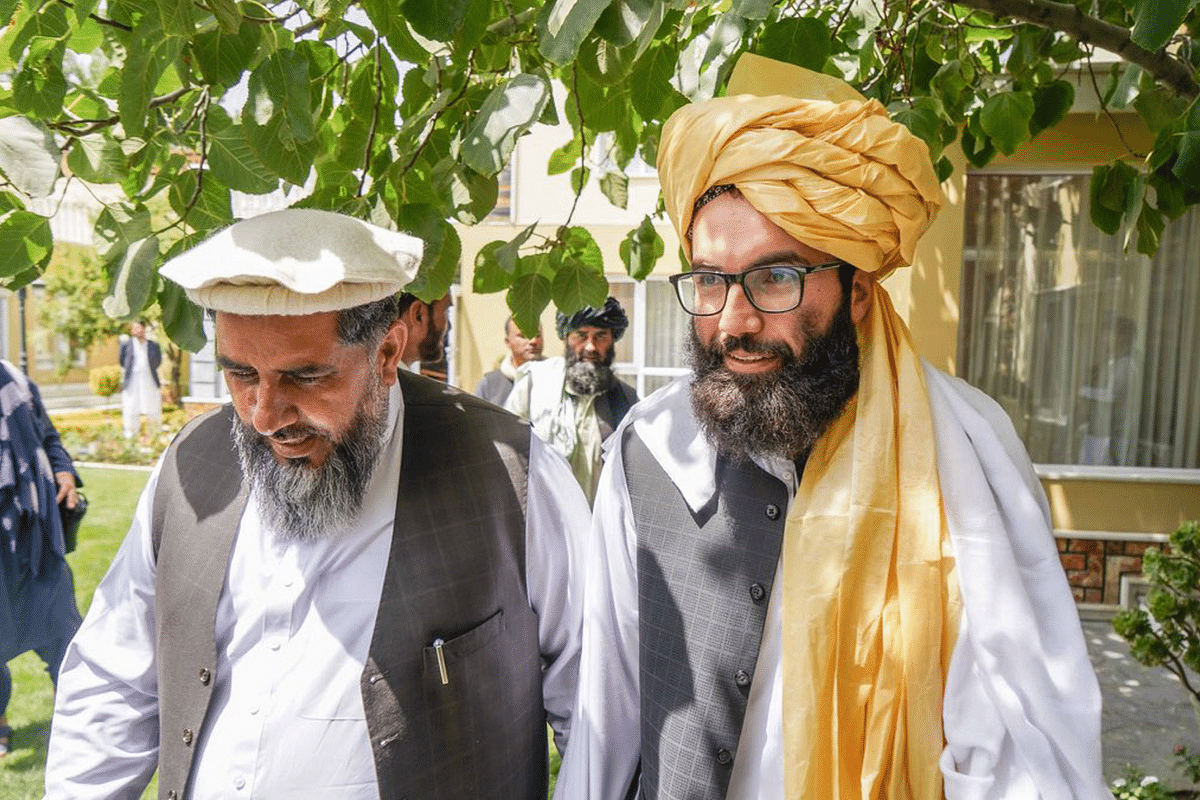News Brief
Haqqani Network And Pakistan's ISI: The Link Between Taliban And ISIS-K, The Group Behind Kabul Blasts
- The possibility of collaboration between the Haqqani Network and ISIS-K for the Kabul terror attack can't be ruled.

Anas Haqqani (right), brother of Haqqani Network leader Sirajuddin Haqqani.
On Thursday (26 August), two explosions ripped through the crowd outside the Hamid Karzai International Airport, killing dozens, including at least 13 US troops just days before they were to leave the war-torn country.
Hours after the attack, the Islamic State Khorasan, or ISIS-K, the branch of the Islamic State active in Afghanistan and Pakistan, claimed responsibility for the blasts, posting pictures of the suicide bombers who carried out the horrific terror attack. It was the prime suspect — the US and its NATO partners had clear intelligence that Islamic State was planning to strike.
The Taliban, Afghanistan’s de facto rulers since 15 August, condemned the terror attack and launched an investigation. There is little hope of this investigation resulting in serious changes on the ground. Although the Taliban and ISIS-K have been fighting each other for years, there is a close link between the two — the Haqqani Network, a partner for both outfits.
The Haqqani Network, according to Mike Mullen, former US Chairman of the Joint Chiefs of Staff, is a "veritable arm of Pakistan's Inter-Services Intelligence agency". The group has been accused of carrying out some of the deadliest attacks on US forces and Afghan civilians in the 20-year war. Designated as a terrorist organization by the US since 2012, the group may have been part of the planning behind the attack in Kabul on 26 August and could have aided the suicide bombers reach the airport.
Khalil Ur-Rahman Haqqani, a member of the Haqqani Network who has a $5m (£3.6m) bounty on his head, is in charge of security for Kabul.
According to Dr Sajjan Gohel of the London-based Asia Pacific Foundation, who monitors terror networks active in Afghanistan, the Haqqani Network has worked closely with ISIS-K in the past, and the two collaborated for "several major attacks between 2019 and 2021".
The possibility of similar collaboration between the Haqqani Network and ISIS-K can't be ruled out in the case of the Kabul bombings — both groups will benefit from a quick exit of foreign troops. Amid talks of US presence at the Kabul Airport beyond the 31 August deadline, such attacks could reduce apatite in Washington for the risk that will come with it.
The current leader of Islamic State Khorasan, Shahab al-Muhajir, is a former mid-level commander from the Haqqani Network.
"Although some Member States have reported tactical or commander-level collaboration between ISIL-K and the Haqqani Network, others strongly deny such claims," the said report reads.
Pakistan is most likely one of the member states who deny the link as the ISI is known to have links with both the Haqqani Network and ISIS-K.
Pakistan's ISI has built the Haqqani Network as an asset to increase its influence in Afghanistan. Apart from targeting US troops and Afghan officials, the ISI has regularly used the Haqqani Network to target Indian interests in Afghanistan and limit New Delhi's presence there.
Pakistan has denied contacts with the Haqqani Network, but the pattern in the activities of the outfit — regular attacks against those inimical to Pakistan's interests in Afghanistan — gives away the link.
The Haqqani Network targeted the Indian embassy in Kabul in 2008 with a car bomb on ISI's instruction, killing 54 people. India had evacuated its diplomats and other embassy staff from Kabul after the Taliban took over the city, despite assurances of security coming from the Taliban leadership, mostly due to the threat from the Haqqani Network.
Former Afghan Vice President Amrullah Saleh (currently serving as Acting President), one of the strongest critics of the ISI in the country, was also repeatedly targeted by the Haqqani Network.
In 2013, Nasiruddin Haqqani, one of the sons of Maulawi Jalaluddin Haqqani, the founder of the Haqqani Network, was killed in Islamabad. The incident had revealed that the group had access to the top echelons of power in Pakistan, including the Pakistan Army.
The group is also playing an important part in the formation of the Taliban government in Kabul. Sirajuddin Haqqani, the head of the Haqqani Network, is also number two in the Taliban. His brother Anas Haqqani, who was sentenced to death by the previous Afghan government, has met former president Hamid Karzai and ex-chief executive Abdullah Abdullah since the fall of Kabul on 15 August to discuss the formation of government.
Introducing ElectionsHQ + 50 Ground Reports Project
The 2024 elections might seem easy to guess, but there are some important questions that shouldn't be missed.
Do freebies still sway voters? Do people prioritise infrastructure when voting? How will Punjab vote?
The answers to these questions provide great insights into where we, as a country, are headed in the years to come.
Swarajya is starting a project with an aim to do 50 solid ground stories and a smart commentary service on WhatsApp, a one-of-a-kind. We'd love your support during this election season.
Click below to contribute.
Latest